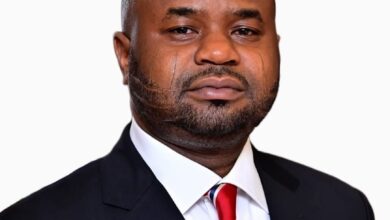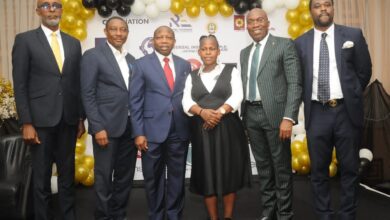N-Power beneficiaries: I am optimistic they will be paid shortly – Minister of Humanitarian Affairs

The Minister of Humanitarian Affairs, Sadiya Umar Farouq, in this interview with Medium.com, speaks on the first year of the Ministry. Excerpts:
Q1. How has the journey been so far, this one year heading the Ministry?
A1. As you know this Ministry was set up in August last year by Mr President which means we are a year old. So first of all let me express our gratitude to Mr President for setting up this Ministry and also thank him for finding me worthy to be entrusted to head the Ministry.
So far for the one year we have been in existence, I would say it has been both challenging and very rewarding. Challenging in the sense that the Ministry is new and taking over responsibilities that were hitherto domiciled in other MDAs and also providing the much-needed coordination of humanitarian interventions in Nigeria. Rewarding in the sense that when I visit the field and I see beneficiaries whose lives are being changed by the FG humanitarian interventions, it leaves us with a sense of fulfilment that we are doing something for humanity.
We have also received tremendous support and hands of friendship and partnership extended to the Ministry from different quarters for which we are grateful
Q2. HM, can you remind Nigerians of the core mandate and vision of the Ministry?
A2. The mandate of the Ministry is to ‘’develop humanitarian policies and provide effective coordination of National and International humanitarian interventions; ensure strategic disaster mitigation, preparedness and response; and manage the formulation and implementation of fair focused social inclusion and protection programmes in Nigeria.’’ While the vision is “To create sustainable and inclusive social systems that promote human dignity in Nigeria.”
The Ministry is facing the prevailing situation in the country head long through the vision, mission and core values of the Ministry by promoting human dignity and integration of basic humane benevolence and compassion in the treatment of all Nigerians
Q3. Which Agencies of Government are under the supervision of the Ministry?
A3. The Ministry as the lead Government machinery responsible for the humanitarian operations and activities in the country has Agencies like;
· National Commission for Refugees, Migrants and Internally Displaced Persons. (NCFRMI)
· National Emergency Management Agency. (NEMA)
· National Agency for the prohibition of Trafficking in Persons. (NAPTIP)
· North East Development Commission (NEDC)
· Social Investment Programmes (SIP)
· Office of the Senior Special Assistant- Sustainable Development Goals.
The Ministry is leveraging on the experience and capacity of these agencies to carrying certain functions, while providing leadership and coordination.
Q4. Some of the Social Investment Programmes have been in the news for some time now, particularly N — Power what is the real picture?
A4. True, the N-Power is just one of our programmes under the Social Investment Programme. Others are the National Home- Grown School Feeding Programme, Government Enterprise and Entrprenuership Programme (GEEP) under which Tradermoni, Marketmoni and farmer moni are captured and the Conditional Cash Transfer. But the most commented about is probably the N-POWER because the beneficiaries are graduate youths who are very active on the Social Media. So, we understand whenever there is a slight delay the complaints mount.
In the period since its inception the programme has enrolled and trained 500,000 beneficiaries. As at the last count about 109,823 beneficiaries from Batch A & B have gone on to set up businesses in their communities, underlining and highlighting the impact and importance of the N-Power programme. Some of them are even currently engaged as aggregators for the Home- Grown School Feeding Programme.
Based on this it is clear that the programme has been a huge success. Given the fact that we have some 40 million unemployed or under employed youths in Nigeria, and that approximately 1.8 million youths enter the job market each year, we must realize that youth empowerment and providing all our youths with jobs is not a sprint but a marathon. Considering, the number of youths needing jobs and the economic realities of our country, we must be very realistic in our expectations.
As it is today, we have exited the Batch A and B beneficiaries totalling 500,000 in June and July respectively. This is in line with the laid down rules for the programme in which each batch is expected to exit after 2 years. The registration for Batch C commenced on the 26th of June and closed on the 9th of August 2020 with a total 5,042,001 registrations received.
As we move to the selection stage the Ministry will ensure due diligence will be applied to ensure that only duly qualified applicants are enrolled. The Ministry will further ensure that the applicants, as well as the general public, are kept fully informed on the progress of the scheme.
I am aware that Batch A and B beneficiaries are yet to be paid June and July stipends. I have since signed off on all payments and I am optimistic they will be paid shortly. For those yet to be paid due to some system issues, this is being rectified. For the N-Power Monitors who have not been paid, I will appeal to them to exercise patience to allow us complete the process and pay them all their outstanding.
I would also like to mention that, the Ministry took over these programmes that have been in existence since 2016, so initially there was the need to carefully study and understand the workings before one starts signing out government funds.
Similarly, the process for payment was initially inter-ministerial involving the Ministry of Budget and Planning and the Office of the Accountant General. Sometime this year, the process was moved to the Ministry directly working with the office of the Accountant General. These changes that are being guided by existing government guidelines sometimes caused delays in payments. Similarly, the movement from the remita platform to GIFMIS has been responsible for some not getting their stipends.
What we have done is to build on the foundations laid in the past while also identifying ways that the programme could be improved as I believe there is no system no matter how good that cannot be improved upon.
Specifically, for the N-Power it is not supposed to be a permanent programme for beneficiaries but as a sort of stepping stone to make the beneficiaries self-employed or gainfully employed. Due to the fact that there are some 50 million unemployed graduate youth’s vis a vis the funds available, the beneficiaries are taken in batches for a period of time then they are weaned out to allow for new beneficiaries to be enrolled.
Q5. What is the stipulated duration for beneficiaries under the N-power program and why did it take this long for the enrolment of Batch C to commence?
A5. Beneficiaries according to the programme design are meant to spend 24 months on the programme. Batch A because of a few exigencies spent over 40 months but Batch B is on schedule. So, in that sense Batch C is not late at all.
And I have explained in other fora, the pandemic has had an adverse effect on economies around the world and Nigeria is no exception. In enrolling Batch C now we are reacting proactively to the need to enhance the human capital and boost the economy.
There are various aspects of the NPOWER programme such as NTEACH, NTECH, N-AGRO etc. The duration differs depending on which NPOWER component a volunteer is registered for. But on average we are convinced from our experience with the pioneers in Batches A and B that a period of between 14 to 24 months suffices to achieve the objectives of the programme. It took us some time to commence Batch C because we had to factor in the lessons we learned with the pioneers in Batches A and B.
Q6. There have been concerns by some people with regards the Batch C enrolment, what is the actual position?
A6. Let me reassure Nigerians that the portal was fully functional and like I said over 5million Nigerian Youth registered in a process that requires no intermediary. Some people complained of not being to access the website, I believe this may have been as a result of the high volume of the traffic when the portal opened. Similarly, it is likely that some of these people have issues with their internet connectivity because if over 5 million registered it is clear the site was okay.
We have taken care to avoid challenges we had with Batch A and B and as I mentioned earlier this meant that we took time to review and streamline the programme for greater efficiency. We are leveraging technology and ensured that every applicant submitted his or her BVN upfront. So, using technology we are ensuring that everything is above board and fully transparent.
By simplifying enrolment through online registration which was announced several days before we opened our portal, we provided a level playing field for all Nigerian youths who want to participate in the scheme.
Q7. Thank you for the clarification, another programme we will like you to speak on, is the Modified Home-Grown School Feeding Programme. Can you shed some light on how the children were fed from home?
A7. Yes, Mr. President directed the Ministry of Humanitarian Affairs to liaise with State Governments and come up with modalities to continue the school feeding programme to ensure the children do not lose out on the nutritious foods being provided. Dry portions of food will be given to the parents of the children enrolled in the programme at a designated place.
Discussions were held through the Nigerian Governors Forum and plans were discussed and it was agreed that take home rations would be provided to the beneficiaries of the program using the existing Structures of the program based on the urgency of the situation at the time. This is termed the Modified Home-Grown School Feeding Programme.
The daily cost of feeding a child of N70 was multiplied by number of days in a month and the amount of 4,200 which was used to purchase the food stuff. Items that were assessed not just for sustenance but also for their nutritional value to children are- rice for carbohydrates, beans and eggs for protein, salt for iodine palm oil and tomato paste for vitamins.
For the sake of the exercise, an average of 3 children per family is assumed. The plan also identified that a typical household in Nigeria has 5.6–6 members with 3–4 being dependent and so each household was assumed to have 3 children. The data used is what was transferred with the school feeding program to the Ministry and is reported from validation exercises from NBS.
Q8. What are some of the interventions the Ministry carried out in response to the Covid 19 Pandemic?
A8. Let me start by saying so far the Ministry and Agencies under it have been involved in distribution of different kinds of palliatives to the most vulnerable in the society, these are refugees and IDP’s, People Living with Disabilities, Older Persons, Trafficked Persons, Orphans, the Poorest of the Poor in Communities, Petty Traders and other Persons of Concern.
The palliatives include;
· Food stuff like Rice, maize millet, sorghum, vegetable oil, tomato paste, milk, sugar and spaghetti.
· Four months of stipends paid at once to those benefiting from the Conditional Cash Transfer to cushion the effect of Covid 19.
· Loans and moratorium to trader and market moni beneficiaries.
· Take- Home Food Rations for Households of Children enrolled in the National Home -Grown School Feeding Programme consisting of rice, beans, vegetable oil, palm oil, tomato paste, eggs and salt.
So far, we have carried out one form of intervention or the other in all the 36 States of the federation. Despite the lock down which has affected movements of everybody including the staff of my Ministry (and here I must thank the Nigerian Air Force for coming to our aid) I have physically visited Imo, Ebonyi, Delta, Borno, Lagos, Katsina and Kano states to name but a few. I plan to shortly carry out the same humanitarian intervention visits to other states.
Q9. Did you encounter challenges in the distribution of palliatives across States?
A9. Distribution of palliatives had some logistical and administrative and challenges. Logistically you can appreciate the difficulty of moving tonnes of relief material across the length and breadth of this country using hired commercial vehicles and with restriction on movement. The ministry does not have vehicles of its own.
Administratively you have the challenge of the administrative set up of the country with federal, state and local government as well as community level governance structures. You have to make a difficult call as to whom do you hand over these palliatives? At what level do you hand over? How do you ensure that those at the grassroots and those that are really in need get the palliatives?
At the end we decided to hand over to the State Governments whom are in a better position to identify and distribute the palliatives to the most vulnerable groups in their communities at the same time ensuring that the Ministry has involved the relevant stakeholders in the process.
Q10. In the last one year what are some of the achievements of the Ministry under your watch?
A10.
* OFFICE SET-UP
I will say a lot has been achieved in year last one year these include establishing the structures and ensuring appropriate manning of the Units and Departments to settle down towards achieving the Ministry’s mandate. Efforts have reached advanced stages for us to put the Ministry in the appropriate office complex to provide working space for all staff.
* HUMANITARIAN INTERVENTIONS AND DISASTER MANAGEMENT
We held the first ever Civil Security Cooperation Workshop (CISEC) which birth the Civil Security Coordination Framework out of which the National Humanitarian Coordination Forum was created and inaugurated earlier this year to ensure the smooth conduct of all humanitarian activities in the country. Other structures include the Humanitarian Policy Dialogue Forum which was established to provide a forum in which the Ministry will interact with all CSO’s and NGOs to provide room to interact and review all government policies and humanitarian activities.
* COVID-19 RESPONSE
Through our Agencies we have provided relief to disaster victims and maintenance of IDPs. In the wake of the Covid 19 pandemic President Muhammadu Buhari put in place the Presidential Task Force on Covid 19 of which I am a member to coordinate Governments response to the pandemic. Specifically, Mr. President gave directives for the Ministry to carry out interventions by providing palliatives to poor and vulnerable groups. We have carried out this directive accordingly.
* NATIONAL SOCIAL INVESTMENT PROGRAMMES (NSIP)
We have also successfully continued the already existing social investment programmes that were moved to the Ministry.
I. N-Power
I have spoken extensively on the N- Power programme but let me reiterate that it has impacted significantly on the lives of Nigerians by addressing unemployment and improving the livelihood of a critical mass of young unemployed Nigerians. Many of the over 100 thousand Batch A and B beneficiaries who own their businesses are also employers of labour, while others have acquired requisite experience and skills that have enabled them secure jobs.
We are gratified to note that through NPOWER we have achieved a net lowering of the youth unemployment figures despite population growth. We are striving to achieve even more.
II. Government Enterprise and Entrepreneurship Program (GEEP)
Government Enterprise & Empowerment Programme (GEEP) is a Social Investment Programme by the Federal Government of Nigeria aimed at addressing the challenges of credit and financial inclusion for the over 37 million Nigerians at the base of the economic pyramid who are involved in active commercial activity, but have never had the opportunity to access loans.
The programme, which is executed by the Bank of Industry (BOI) under the direction of the Ministry of Humanitarian Affairs, Disaster Management and Social Development, leverages extensively on data, technology, mobile phones and a network of 4,325 agents deployed in all the 36 states and the FCT.
In this way GEEP under the Ministry has continued to provide incremental loans of between N10,000 and N300,000 to traders, artisans, enterprising youth, agricultural workers and other micro-service providers; under its flagship programs TraderMoni, MarketMoni and FarmerMoni.
Since its inception in 2016 to date GEEP has empowered over 2.3 million such micro-enterprises with interest-free loans to grow their businesses, making it the largest public microcredit program globally, as well as the Most Impactful Micro-Credit Program in Africa as recognised by the African Bankers’ Awards in 2019 held in Equatorial Guinea.
Reach
– 4,325 Agents in 36 states + FCT
– 2,678 Clusters or Markets, Traders & Farms
– 4,988,926 enumerated and verified applicants (out of a total pool of 9.3 million registrations)
Demography
– 54.3% Women (target is 60%)
– 53% Youths (18 -35 years)
Financial Inclusion
– 352,000 new bank account users thanks to GEEP
– 1.95 million new Mobile Wallets
Beneficiaries
– N36.3 billion Disbursed
– 2.2 Million Beneficiaries
– 2.7 million candidates on the waiting list
COVID-19 Response
As part of the Coordinated COVID-19 Response led by the Federal Ministry of Humanitarian Affairs Disaster Management and Social Development, GEEP partook in the following activities:
1. Moratorium Extension: 3-Month Moratorium extension as per the Presidential directive implemented and communicated to 1.8m beneficiaries with active loans.
– Immediate suspension of loan repayment protocols for the 3-month extended Moratorium directive issued by the President.
– SMS notification of the extended moratorium to ALL beneficiaries with active loans.
III. Conditional Cash Transfer
The CCT Program has achieved the following since its relocation to the Ministry of Humanitarian Affairs, Disaster Management and Social Development;
In April 2020, six thousand Eight hundred and ten (6,810) beneficiaries in Lagos State were enrolled in the program, these beneficiaries have started receiving the cash transfers
Abia and Zamfara States Previously not receiving payment have also started receiving payment.
Beneficiaries enrolled into the program increased from 630,964 Poor and Vulnerable Households with direct household beneficiaries of 3,201,402 as at August 2019 to 1,289,405 Poor and Vulnerable Households with 6,443,878 direct household beneficiaries as at August 2020.
Numbers of beneficiaries receiving payment increase from 469,362 HHs in 22 States to 748, 684 HHs in 25 States. Payment is Still ongoing in Lagos and Zamfara State.
* National Social Register
– At the onset of the pandemic, the National Social Register (NSR) contained data of over 2.6 million poor and vulnerable households (with over 11 million individuals) across 34 States and the FCT. With the accelerated registration and rapid expansion, the register has as at June 30 grown to 3.7 million (equivalent to 15.5 million individuals) across 36 States and the FCT.
– In addition, the Ministry has finalized processes for the development of the COVID 19 Rapid Response Register targeting the Urban Poor, Semi and Peri — urban areas. This register will use existing databases from NCC, BVN, SMEDAN etc; and synthesize these data for validation and registration. The World Bank has provided support in finalization of the template to filter the poor and vulnerable from these databases for validation and registration.
* PARTNERSHIPS AND COLLABORATIONS
In general, looking back one of the greatest achievements we have is developing a very cordial and understanding relations with all the humanitarian actors operating in the country, other government MDAs and the armed forces and other security Agencies in the country amongs others. We are not there yet but I believe we will progressively realise our vision and mandate.
* AGENCIES OF THE MINISTRY
Lastly but by no means the least is the integration of all the Agencies and programmes brought under the Ministry and the establishment of a common understanding and working relationship with a view to delivering on our individual and collective mandates.
Q11. Going forward in the next few years and in the face of COVID 19 what should Nigerians expect?
A11. Well as you know at the moment, we generally have two types of interventions: first are the interventions arising from the national COVID 19 response as directed by Mr President. Then there are interventions arising from our mandate as a Ministry which predate COVID and will continue even after COVID. What I can assure Nigerians is that the Ministry of Humanitarian Affairs Disaster Management and Social Development will adopt a proactive rather than reactive approach to all kinds of humanitarian disasters. We will also continue to involve CSOs, NGOs, development partners and the Private Sector in all our interventions. We will also leave our doors open to hear constructive criticisms on our interventions because we are responsible to the people of Nigeria and we believe that there is no system that cannot be improved. We will seek to ensure transparency and accountability in this regard, we invited appropriate agencies like, EFCC, ICPC and Code of Conduct Bureau, CSOs, NGOs like the World Food Programme to ensure transparency and accountability.
Q12. What are your final words?
A.12. In the end I would like to assure Nigerians that the Ministry will in line with the aspirations of Mr. President do all we can to ensure that we meet the expectations of our citizens regarding the mandate given to us.
I must also thank the Governors of the 36 States and Minister of FCT as well as members of the National Assembly from whom the Ministry has been receiving tremendous support. Humanitarian Affairs, Disaster Management and Social development are areas that require the support of many stakeholders.
It is with this in mind that I also acknowledge support we have received from the Private Sector, the Media, Civil Society Organizations, NGOs, international Development Partners; leaders of the various groups of persons of concern such as those living with disabilities, and the elderly.
I must also acknowledge the support of the Religious and Traditional Leaders. Very importantly I must express my appreciation to my staff in the ministry who work beyond normal working hours and during public holidays to ensure we provide succour to those in need.
I would like to also commend and appreciate the leadership and the staff of all agencies under the Ministry.





